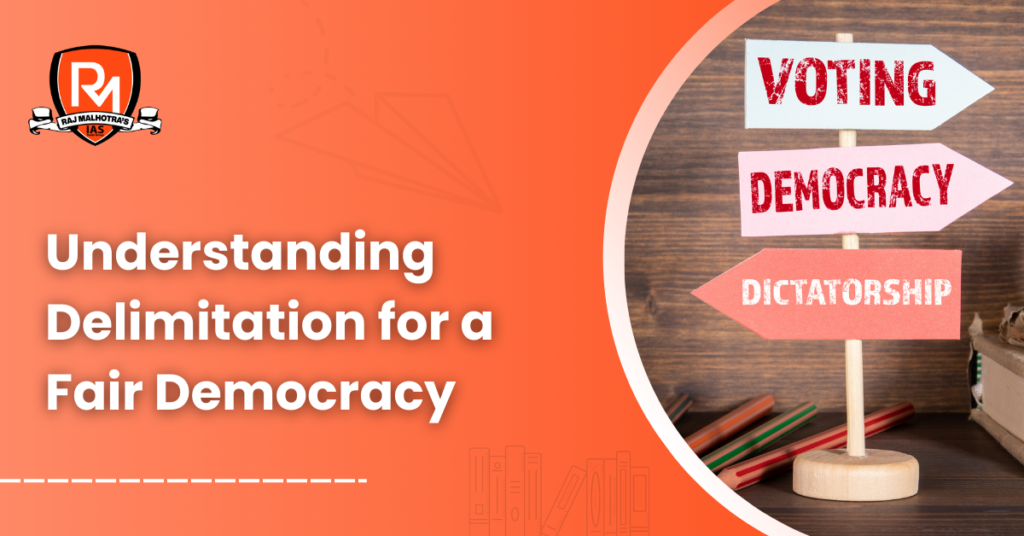At Raj IAS Academy, we understand the dedication it takes to start on the UPSC journey. Our mission is to help you achieve your dream of becoming a civil servant and contributing to the Nation. We go beyond to help you prepare for the UPSC exam. We provide an overall preparation for success with expert guidance, high-quality study materials, Current affairs, UPSC Mains Answer Writing practice and a supportive environment. Join us at Raj IAS Academy, one of the best UPSC coaching in Chandigarh, and take the first step towards your dream to crack UPSC.
Imagine you’re the teacher in charge of a giant classroom in India! In a fair classroom, everyone gets a chance to participate, right? But with so many students (states), giving everyone an equal voice is tricky. That’s where Delimitation comes in. It’s a process that redraws electoral boundaries like classroom seating charts to ensure each area has a roughly equal number of people. This helps make elections fairer because everyone’s vote has a roughly equal weight.
“Democracy is a government of the people, by the people, and for the people” — Abraham Lincoln.
The UPSC syllabus likely introduced you to the concept of democracy. Today, we’ll focus on an essential aspect of a functioning democracy in India as outlined by the Constitution: Delimitation. In a vast nation like ours, a proper system is necessary to ensure the fair and lawful distribution of power. Let’s explore why Delimitation is crucial for a just democracy.”
What is Delimitation?
Delimitation is the process of deciding how many seats and where the boundaries of voting areas (constituencies) should be for the Lok Sabha and State Legislative Assemblies.
1.It also means figuring out how many seats should be kept aside for Scheduled Castes (SC) and Scheduled Tribes (ST) in these areas.
- A group called the Delimitation Commission, set up by a special law from the government, does this job.
- They’ve done this task four times before: in 1952, 1963, 1973, and 2002.
- At first, back in 1950-51, the President handled this task with help from the Election Commission.
Delimitation: How Can We Ensure Fairness in Our Democracy?
Understanding Delimitation with an example
Imagine you’re picking teams for a big game. Delimitation is like deciding how many players each team gets (number of constituencies) and who plays with whom (constituency boundaries). This is important because everyone deserves a fair shot at being picked (representation in government) as the number of players in each area (population) changes over time.
Navigating Complexity: Delimitation Challenges in India
In India, things get complicated because different regions have different numbers of people and interests. It’s like some neighborhoods have a lot of kids (rural areas might need more representatives) while others have mostly adults (cities might need fewer). Delimitation has to consider all this to make sure everyone has a roughly equal chance of being picked for a team (fair representation in government). We’ll discuss the challenges of making these fair teams (delimitation complexities) and how to solve them later.
Trying to make sure everyone gets a fair chance: Lessons from classrooms.
Delimitation is like deciding how many representatives each class gets. In a perfect world, everyone would get a fair say (equal representation). But things get tricky. If you just pick based on how many students are in each class, the bigger classes would always have more representatives. This might leave the smaller classes feeling unheard (states with smaller populations losing power).
Making things fair: Looking at how the US does it.
A good system, like the one used in the US, where there’s a limit on how many representatives each state gets, makes sure everyone has a voice, regardless of class size (state population). This is important to keep things fair and balanced (upholding federalism). We’ll talk more about the challenges and solutions to this later.
The Problem of Too Many People: Understanding How Populations Grow
Imagine picking teams for a big game again, but there’s a twist this time! Some teams get a bonus player (increased representation) if their numbers keep growing (unchecked population growth). That seems unfair, right? Teams that work hard to keep their numbers steady (population control) actually get fewer players!
The Role of the Delimitation Commission: Ensuring Fairness
The Delimitation Commission, like the referees, tries to make things fair. They consider how many people live where (demographic realities) and come up with a plan that gives everyone a fair shot at having a say (representation). Freezing the number of players isn’t the only solution. Maybe we could add a few extra players to each team as the whole game grows (proportional increases in seats). However, we need to be careful not to mess things up too much (critical evaluation) while finding a way to give everyone a fair chance to play (equitable representation).
Understanding the Complicated Mix: Federalism, Democracy, and Population
When talking about Delimitation, candidates need to understand how federalism, democracy, and population changes all affect each other. Questions might ask candidates to talk about things like whether delimitation plans break federal rules, how population growth affects these plans, and the challenges faced by the Delimitation Commission. They might also need to explain their own ideas for fixing these issues and know what other countries do about them.
Towards Fair and Inclusive Representation
Handling delimitation means looking at the big picture. It’s about finding a fair balance between different needs and making sure everyone’s voice gets heard. India can learn from other countries and come up with smart solutions that respect democracy and represent everyone well. By discussing these topics openly and making thoughtful decisions, we can make sure Delimitation works well and reflects the diversity of our country.
Strengthening Democracy through Fair Representation
In simple terms, Delimitation isn’t just about drawing lines on a map. It shows how much we believe in sharing power between states and making sure everyone’s voice counts in our democracy. If we understand how it works and push for fair decisions, we can make our democracy stronger and make sure everyone is treated fairly in the future.
This was a step-by-step understanding of the role of Delimitation in a fair democracy. As UPSC aspirants, we understand how important it is to understand concepts deeply. That is why Raj IAS Academy, one of the top UPSC coaching in Chandigarh, provides a thorough discussion of topics. Such discussion will help you with UPSC Mains Answer Writing and UPSC preparation covering almost all the aspects of UPSC syllabus. So that you can write well on exams. We even have a detailed discussion to help you improve your analytical skills. We are available 24/7 for you. Contact us now for any queries.






